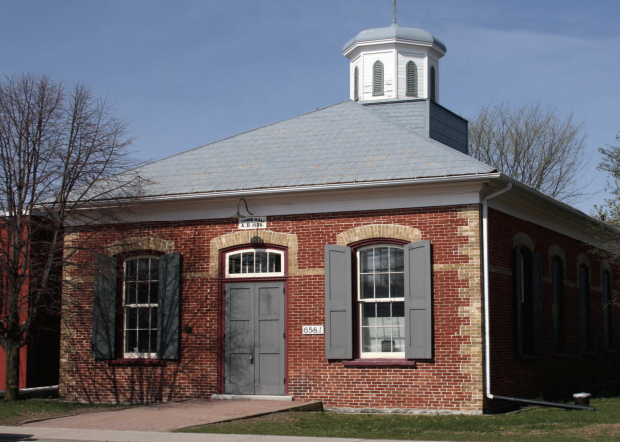History of the Archives Building in North Gower
Article Author: Betty Bartlett. From the June, 2008 edition of the RTHS Newsletter.
Presenting our building, compiled from information in the LACAC file, labelled 6581 Fourth Line Rd. (Main St. North Gower)

Building History
- 1850 – 1876 – municipal meetings held in James Johnston’s Hotel • 1876 – construction of the North Gower Town Hall
- 1967 – new municipal office built – old building turned over to the Fire Department who added a garage on the north side (later recycled to become the Library)
- 1970’s – Fire Department moved elsewhere
- 1979 – designated a Heritage Building
- 1980’s – Rideau Township Council decision to restore and maintain the building as a home and study centre for Rideau Township Archives.
- 1990 – Sept. 15 – official opening after extensive repairs, largely by skilled volunteers.
Building Architecture
The Reasons for Designation state: “The one storey, brick faced structure is a fine example of a modest type of town hall, interesting architecturally due to its fine proportions, careful detailing and cupola.”
Many features of the original interior have been retained. Note the 12’ ceiling, the large windows which provide good daylight, the original pine wainscoting, the maple hardwood flooring with its herringbone pattern, and the coat hooks on the wall by the door which were placed unusually high so that people could sit on the bench below.
The stage was lowered to about 8” to make way for the office, bookshelves, and the vault. Volunteers removed the old wood stove that had been blessed and cursed by generations of councillors and audiences.
Building Importance
Bonnie Abel on p.5 of the Heritage Edition of the Kemptville Advance, February 26, 1992 reports:
Mrs. Muriel Jago (nee Craig), a long time resident of North Gower, who lived in the house next to the Anglican Church in North Gower, recalls in written notes, her memories of events she witnessed that have taken place in the North Gower Town Hall.
“Besides being the Township Office where sittings were held monthly at least, (the Town Hall) was the gathering place for social events in cold weather. Assemblies were frequent and took the form of progressive euchre games until 11 p.m.” “Bags containing coffee or tea were thrown into a copper boiler of steaming hot water. The keeper of both the boiler and the fire fuelled to keep the water hot and ready, was R.A. Craig, who lived next door..”. “After a lunch.. was served, and prizes for first and second euchre standing were awarded, the music begins”.
A fiddler and a piano-player set a lively repertoire for dancers which lasted until three or four a.m. The Town Hall did not then, or now, have its own piano. A piano was donated by one of the villagers for the evening’s usage. Mrs. Jago writes that the piano itself was then transported “carefully by sleigh, and placed on the stage in the afternoon.”
Box Socials, the custom of choosing a dancing partner by buying a box lunch, were followed by a dance at the Town Hall. It was here that Muriel Craig Jago became introduced to village dancing. She writes of one man who was the “village caller for square dances”. “I can vouch for his strong voice – no one could miss what he said.” “He acquired volume from driving a team of mules but he did not use the same language.” “When several sets of squares got going, the old white board floor – liberally sprinkled with boracic acid powder and cornstarch, shook and shivered and was really a lovely floor to dance on because of that vibration.”
Concerts were for fund-raising. At Christmas, “a huge evergreen tree was cut, hauled and set up in one corner of our old hall, by somebody. Somebody, too, set up little tin candleholders and small candles and other decorations.”
“At night, recitations, drills and short plays were presented making sure that each child had a part.” “The National Anthem was sung in unison, the candles lighted, and all the presents distributed by Mr. HO HO HO, who seemed to know a good many of those present.” “Our stage was very nice – not large, but had a real curtain raised and lowered on a roller that often got stuck at one end, and interrupted many a moment of crisis in the story portrayed.” Footlights with mounted reflectors skirted the front of the stage. The same kind of lamps hung along the walls of the hall, and were the essential source of interior lighting in the hall.
Political meetings were regular events. Sir Robert Borden stayed overnight in the village of North Gower. The Honourable Arthur Meighen gave an address to the people of North Gower in the Town Hall, during the early nineteen hundred and twenties. His topic was more of a lecture on the absence of a contribution from British subjects living in Canada towards the upkeep of the British Navy, “our great protector.” “Supper was later served…when Mr. Meighen announced (that) he preferred (only) the dark meat of the turkey.”
